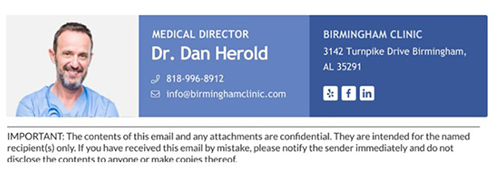With several unique changes occurring in the healthcare arena, digital marketing for healthcare is quite challenging. Building a strong online presence is important for healthcare practices to grow. Healthcare providers are on the constant lookout for unique strategies to communicate with the patients and keep up with the changing SEO trends. Healthcare email marketing is an effective digital marketing strategy for healthcare practices planning to extend their reach.
It enables healthcare providers to directly connect, interact and maintain communication with potential patients and increase patient retention at their practice. Utilizing healthcare digital marketing services provided by a professional agency can help physicians implement the right email marketing techniques, gain the target user’s attention, and achieve maximum conversions.
Benefits of Email Marketing for Medical Practices
There are several benefits that an email marketing campaign can offer to healthcare practice. It allows providers to easily and quickly communicate with patients.
- With this strategy, you can target the message to a particular audience group or personalize communication to certain individuals.
- In addition, the strategy offers a platform to schedule messages well in advance.
However, healthcare email marketing doesn’t have to be limited to just appointment reminders and other routine information. It can also be used to market a specific healthcare practice by sending out newsletters or giving them tips on how to stay healthy or manage certain health conditions. Successful healthcare email marketing campaigns require careful consideration of several important factors.
Some Dos and Don’ts of Email Marketing
Here discussed are some dos and don’ts of email marketing –
Dos
- Understand the Legal Constraints – When it comes to email communication in healthcare, there are certain legal constraints. HIPAA guidelines allow the constant protection of sensitive patient information. Delivering sensitive information through non-secure accounts increases the risk of violating HIPAA guidelines. Therefore, taking adequate protective measures like secured delivery and encryption of sensitive data is crucial.
- Educate Patients about Communication and Security Policy – Healthcare providers need to explain in detail all the data security policies in place to patients before they send any of their private information. If an insecure account gets hacked, all the information they send may be at risk. Including a HIPAA email disclaimer can remind patients about the sensitivity of the content.
- Share Educational Content – Often, people visit a healthcare website in search of health-related educational content. Sharing educational information with patients can help gain their trust as they are getting credible information from a physician or healthcare practice that has ample experience in this field. This in turn helps build the valuable trust of patients. Some of the top content ideas that can be shared via email include – health news related to current events, steps to prevent common ailments, expert-reviewed medical articles and case studies, seasonal brochures, pros and cons of certain medical procedures and medications, and more.
- Send Appointment Reminders – Automated appointment reminders are an important part of email marketing as it helps attract a greater number of patients to healthcare practice. Generally, if patients don’t get messages from a practice, chances are that these could end up in the spam folder. However, if a healthcare practice already communicates with a patient via email, then these reminders will end up in their inbox. Creating automated reminders using templates will help simplify the whole process.
- Share Office Updates – It is important to share updates about the office electronically. While it’s useful to add updates about the office on the website, the chances of current patients visiting the website will be low. Sharing updates like – changes in office hours or phone numbers, visiting procedures, or a new appointment reminder via an email can increase the chances of these updates being received or viewed by patients.
- Make Emails Mobile-friendly – Often, people tend to check their emails on a mobile device. Try to keep the content of emails simple and to the point. If the content of the email tends to be confusing or difficult to read on a mobile device, the target users may lose interest. Avoid small links and buttons; as people should be able to easily click on what they want. Also, avoid side-scrolling; opt for a column-style layout that allows users to easily zoom in if required.
- Generate an Automatic Response – Try to generate an automatic response when someone sends a message. This gives an acknowledgment that the healthcare provider has received the message and will get back to them as soon as possible.
- Maintain a Mailing List of Patients – Mailing lists are a great way to keep track of those clients or patients who want or expect to receive communication from a healthcare practice. This may help the practice understand that they are sending emails to inactive accounts, or people who don’t want to receive any correspondence.
- Use an Email Signature – When sending an email to patients, always try to use an official electronic signature as this helps them to identify or understand that it’s a legitimate message. A signature can include – office information like operational hours, phone numbers, and address. This gives patients a quick way to identify when they have an appointment or contact the office directly.
- Promote Special Offers/Discounts – Sending email notifications about special offers on products or services helps retain clients. Sending coupons and discounts show that a practice values and cares for their patients. For example, dentists can send coupons for oral care products. Providing relevant offers ensures that these products are essential for the client’s needs.
Don’ts
- Send Emails Where Recipients Are Visible to Each Other – When sending group emails, make sure that the recipients aren’t visible to each other. Sharing personal details like names and email addresses to unauthorized individuals could result in a privacy violation.
- Forget to Check the Recipient’s Email Address – Sending an email to the wrong recipient is avoidable, but it can occur. Always check the recipient’s email address and confirm that all attachments and information are sent to the right patient. Even if a wrong recipient does not read or copy the contents of an email and they immediately delete it forever, it’s still a violation to send PHI to an unauthorized person.
- Send Unencrypted Private Data – Encrypting private data is one of the top ways to protect it, particularly when sending it electronically. It scrambles the information and requires a key to decrypt. Even if an email is sent to the correct person, it’s safe from security breaches. If someone else were to intercept the email or in case it is sent to the wrong person, it still requires a key to access the content of the email. A healthcare practice can’t control data once it reaches a recipient’s inbox. By encrypting data, you can prevent unauthorized access to the content of the mail.
- Use Complex Medical Terms – Never use complex medical terms and acronyms when sending emails about health information, as people may turn to search engines to understand these terms. If at all any specific complex terms are used in the descriptions, make sure to define them or break them into simple language, as this helps resolve any confusion among patients.
Implement an Effective Email Marketing Campaign
If implemented in the right way, email marketing is an effective tactic to attract potential patients, build strong relationships, and retain them at a healthcare practice. However, even a small mistake can make patients unsubscribe from a specific healthcare service. Therefore, performing a clear analysis of the dos and don’ts of email marketing can help generate more leads and also retain existing patients.
Availing digital marketing services provided by an experienced search engine optimization company can help implement an effective email marketing campaign that helps directly connect with the patients and retain them in the long run.






